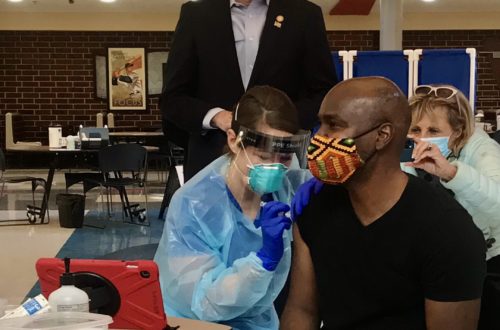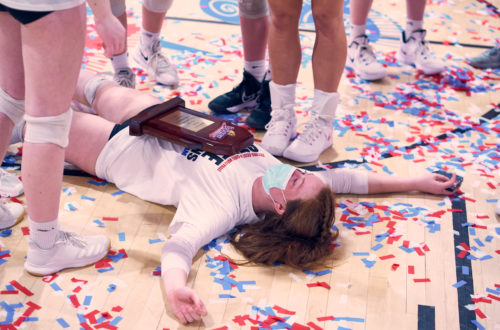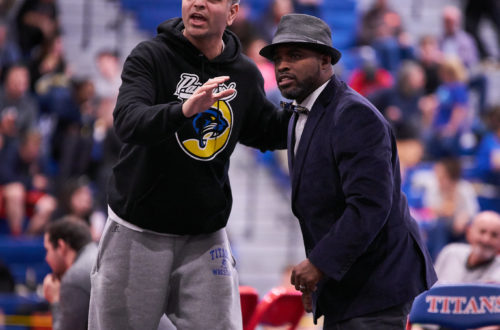Preparing special education students for post-secondary life
Abigail Ernst
Amazing opportunities await the Citywide Special Education students in Alexandria. Unlike most middle schoolers, Citywide Special Education students go directly from middle school to the T.C. King Street Campus, bypassing Minnie Howard altogether. They begin high school in the Career Preparation program, a program that prepares students with disabilities for life beyond their post-secondary education.
The program has approximately 50 students and nine teachers. Teachers teach students with varying disabilities–from those with severe disabilities in the multiple disabilities classroom to more high functioning students that go to the various job sites affiliated with the program. There are instructional assistants that are assigned to assist each teacher, and in certain cases students have a personal instructional assistant called a One-to-One.
Jody Hambrice and Christopher Fuller are teachers who travel to off-campus job sites. They are part of the Career Preparation program at level four, which typically consists of students who are seniors or postgraduates.
Once admitted to the program, students advance through the career preparation levels one through three. From there, students move to the career prep level four, which Hambrice and Fuller work with students.
Postgraduate students are students who return to school after graduation. The students graduate with an applied studies diploma, as well as job experience. Students are eligible to remain in this program until their 22nd birthday. After graduation, some students attend a two or four year college or go straight into the workforce.
The current program started at T.C. when the new building opened in 2007. Tammy Ignacio, the lead administrator for specialized instruction says that before the opening of the new building, when Mr. Porter was the principal, there was a career preparation program with a different name. She also said, “The program has grown significantly and our students have become a bigger part of the community, with the help of our teachers, instructional assistants, and the leaders at the central office. Community partners have also allowed the program to grow.”
Fuller said, “Having the parents be supportive, especially during these times, helps us to do our jobs the best we can.”
Students are eligible to join the program based on their Individualized Education Plan (IEP). Ignacio says various testing takes place to determine a student’s placement based on their needs. She mentioned, “it is really a data driven decision.” Some students with significant disabilities receive additional programs to help fulfill their needs.
Within the program, students learn skills like self-advocacy, math, literacy, job skills, and life skills. These skills are not only acquired through the classes they take, but through the jobs they perform within the program. When students are at levels one and two of the program, they typically work in, The Kick, the coffee shop housed at T.C. William King Street Campus. However, as they move up into the program to level four, they begin doing work at a jobsite or different places at T.C. depending on their interest and abilities. This part of the program is called the project search.
Students have to interview for the Project Search Program, which gives them the opportunity to go through the process of getting a job. In past years, students have obtained jobs at the Marriott in Crystal City, which Hambrice was in charge of, or the Residents Inn, which Fuller oversees. Students can also have internships at flower shops, pizza restaurants, Great Harvest, Plate 22, and others. One job through project search that is an amazing opportunity is the partnership with INOVA hospital.
The partnership with INOVA started eight years ago. Ameeta Shah is the only instructional specialist within the program along with two other job coaches. Shah said, “the program is a collaboration between our school system, the community, and the department of rehabilitative services.” It is built for students that benefit from non-traditional education.
The INOVA program is for students with disabilities between the ages of 18-21. These internships at the hospital include many departments students can train in. Students can intern with the medical staff, where they do clinical rotations and learn medical tech, or they can work in the offices, food services, patient transport, or warehouse materials management, environmental aspects, among many other departments.“You can get so many different avenues that they can try so many different experiences they can have based on what their career interests are,” Shah says. She coordinates all of this.
However, students cannot do this program and another program; for example, a student can not work at the hospital and a hotel because they are full-time programs.
To get into the INOVA program, students are recommended by their case manager and counselor, then go through an interview process. Students have to pass a drug test as well.
Shah says, “the point is to give students internships and experiences in the real world, which they can carry on throughout their lives.”
During this program, students have a job coach, who helps them fill out applications, go to interviews, and other assistance, if needed. A unique aspect about this program is after students graduate from T.C. and/or the postgraduate program, they will have lifetime support from the Department of Rehabilitative Services.
Shah wants there to be an awareness of the program, so students know there are options available to help them be successful in school and in the workplace. A way for all T.C. students to get involved with the students of the Career Preparation Program is through Best Buddies. Ignacio said Best Buddies not only allows students to have a mentor and a friend, but it helps students develop skills to be successful and become a bigger part of the T.C. community. “The Best Buddies program puts it at a whole different level for those kids, and they really look forward to and love being a part of that program,” Ignacio said.
With coronavirus still affecting everyday life in the U.S., most of the students are not able to perform internships like they normally would. Most students are being taught virtual lessons about aspects of transportation, such as bus schedules, routes, and time management. Hambrice said, “if [the students] can manage public transportation, it opens up so many doors for them in terms of employment.”
In addition, students learn about job applications, interview skills, google searching, problem solving, and gaining an understanding of the necessary skills to perform a job. Students in the INOVA program are back in person; however, not all are at the hospital.
Hambrice said, “We do our best to give the students as many work experiences as we can within the hotels and other sites within the community.” The Career Preparation program helps prepare these students for their future through these opportunities and support from the program’s staff and the students’ parents.





